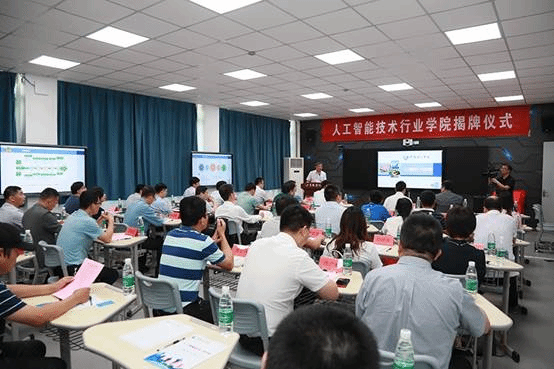
On May 28th 2020, Changshu Institute of Technology founded the Artificial Intelligence Technology Industry College and signed a strategic cooperation agreement with Neusoft Education Technology Group, Beijing Pukai Data, IFLYTEK CO.LTD. and other companies.
Gong Shengrong, Dean of the School of Computer Science and Engineering, introduced that after the establishment of the Artificial Intelligence Technology College, it will follow the five-in-one concept of industry, school, enterprise, government, and park to adopt the new "1+1+1+X" path model to strengthen construction. Specifically, it will join a group of leading companies to provide industry employment standards, experiment training conditions, teacher training, and school-enterprise cooperation research project and development for industry colleges. Rely on local enterprises to build an IT alliance to provide the industry colleges with enterprise technology requirements and talent needs. The industry college will be linked with a local big data and an artificial intelligence industrial park to jointly build an internship training base. On this basis, facing industries such as industry, finance, health, transportation, and security, the industry college will cultivate application talents of mastering artificial intelligence technology.
"According to the talent training program, the AI industry college mainly adopts two teaching modes: "1+3" and "2.5+1.5". Gong Shengrong said that the former selects outstanding students from the first-year students of different majors in the school to enter Artificial Intelligence Industry College, in accordance with the needs of different industries for artificial intelligence technology. The purpose is to cultivate talents in artificial intelligence technology that understands the needs of the industry. The latter is for the Students of all majors in the second or third grade. After joining the Industry College, students will focus on strengthening the study of artificial intelligence technology, especially through the case-based teaching to strengthen the application of artificial intelligence platforms and development tools in various industries.
"The talent training process should implement the "dual element" of the college and the enterprise, the "dual teacher" teaching of the college teacher and the enterprise engineer, the "dual real" training of the real environment and the real data from the enterprise, the "dual source" learning of online and offline resources, the 'dual station' practice of Cour-seGrading artificial intelligence integrated support platform and the Pukai big data teaching platform. All the measures are to build a practical teaching system with ability training as the core." Gong Shengrong said, "At the same time, the industry college relies on the construction of "innovation workshop" to strengthen Innovative method training, optimize innovative thinking ability, stimulate students' 'double innovation' vitality, and enhance students’ technological innovation ability."
It is said that the Industry College is Changshu Institute of Technology's initiative platform to connect regional leading industries, pillar industries and strategic emerging industries. Focusing on the key enterprises, integration policies, resources and intelligence and other factors, the industry college is able to jointly cultivate application-oriented talents. As the first university to propose the "Industry College" model in China, Changshu Institute of Technology has created a number of distinctive industry colleges in the fields of automobiles, elevators, textiles, garments, biomedicine since 2009. "Academy" has become a characteristic "business card" for the cultivation of applied talents in Changshu Institute of Technology. The establishment of the AI Technology Industry College and the layout of the AI industry field, Changshu Institute of Technology will further improve the quality of the school's applied talent training, and provide high-quality talent support for local economy and promote AI enterprises transforming and upgrading.
